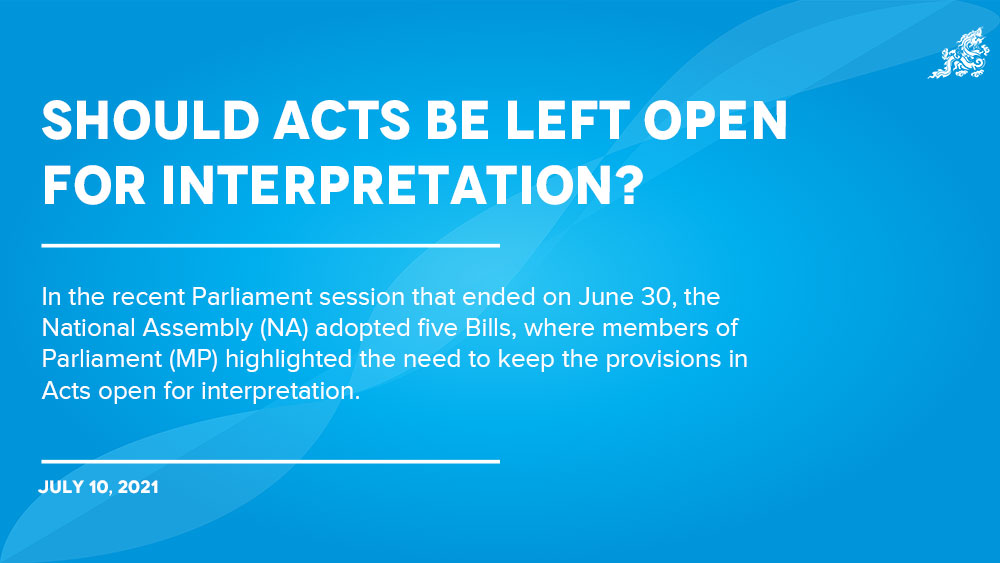Tashi Dema
In the recent Parliament session that ended on June 30, the National Assembly (NA) adopted five Bills, where members of Parliament (MP) highlighted the need to keep the provisions in Acts open for interpretation.
During the extensive deliberation on the Bills, some MPs raised the need to make laws specific, but many claimed it should be left open for interpretation (Go yang tok to) for the convenience of those implementing the laws.
Some sections of the people, however, said such provisions breed room for confusion, as those implementing the laws interpret it at their own convenience.
A Thimphu resident, Nima, who had a matrimonial case, said since the law on paying alimony is left for interpretation, court officials made him pay based on his gross salary although law stated it should be on net pay. “Their justification is that gross salary is also my income.”
He said courts interpret it as they want, which is not fair. “When laws are left open for interpretation, judges, police and prosecutors could interpret it to suit their purpose.”
He followed the parliamentary deliberations every day and said he was worried when legislators said it should be left for interpretation. “I feel it has to be specific.”
Nima litigated his case in 2020 where he alleged the judge passed the judgment based on 1996 Marriage Act and refused to acknowledge other amendments and executive orders from the Chief Justice.
He said the 2005 and 2009 amendments clearly mentioned if the reason for divorce is from the mother, the child alimony should be divided equally between the parents. “But the court officials rejected all my submissions.”
He appealed to the High Court, which passed the judgment based on his submission. “It would be a hassle for people who reside out of Thimphu to come all the way to Thimphu to appeal.”
A corporate employee, Ugyen, argues that when judges pass different judgments on the same case based on their interpretation, people lose faith in the justice system.
He said many provisions in the Anti-Corruption (Amendment) Bill were left open for interpretation.
Implementing agencies like the police also said procedure law has to be specific.
An official explained international laws are definite with case studies on how to interpret it. “When it is open for interpretation, common people suffer,” said a police source.
He cited the example of how judges even refer to international laws and dismiss cases when it is left open for interpretation. “In sexual harassment cases, some judges interpret only what is specified in law and some draw reference from international laws. There should be specific laws.”
A legal head of an organization, however, explained any law will have intent and knowledge and law enforcement agencies should not have a problem, as they just implement what is there.
He explained the first case would set precedence for the interpretation. “If the public and practicing lawyers know the precedence, there is no ground to interpret it loosely.”
MPs, including finance minister and Prime Minister during the discussion on the Anti-Corruption (Amendment) Bill also said law should be left open for interpretation so that it is convenient to implement and said relevant organisations should have their own rules and regulations.
Speaker Wangchuk Namgyel said ‘Go yang tok to’ means from the reasonability point of view. “When it is implemented, it will depend on the interpretation.”
Citing an example of tobacco law, he said specifics would be in rules and regulations. “If we make law (Act) specific, there will be problems. We can’t distinguish between the Act and Rules and Regulations.”
He said the Constitution is broad so that it gives room and wisdom for people to explore it. “Even in laws (Act), there has to be room for interpretation.”
A National Council member said the main objective of passing a law is to ensure it is clear so that there is no room for abuse of power, but it is not possible to legislate all issues. “It will not be possible to comprehend all possible problems while framing laws.”
He said courts will interpret laws within their bounds and they would follow the law of statutes and rule of interpretation while interpreting it.
He explained there is a misconception among the public and officials that the judiciary has too much power, but such discretion is necessary, as sentencing should depend on intention and all matters surrounding the crime. “Every crime is different in nature.”
A Justice also explained there are enough checks and balances to ensure law is interpreted correctly and the public should not worry about it.


